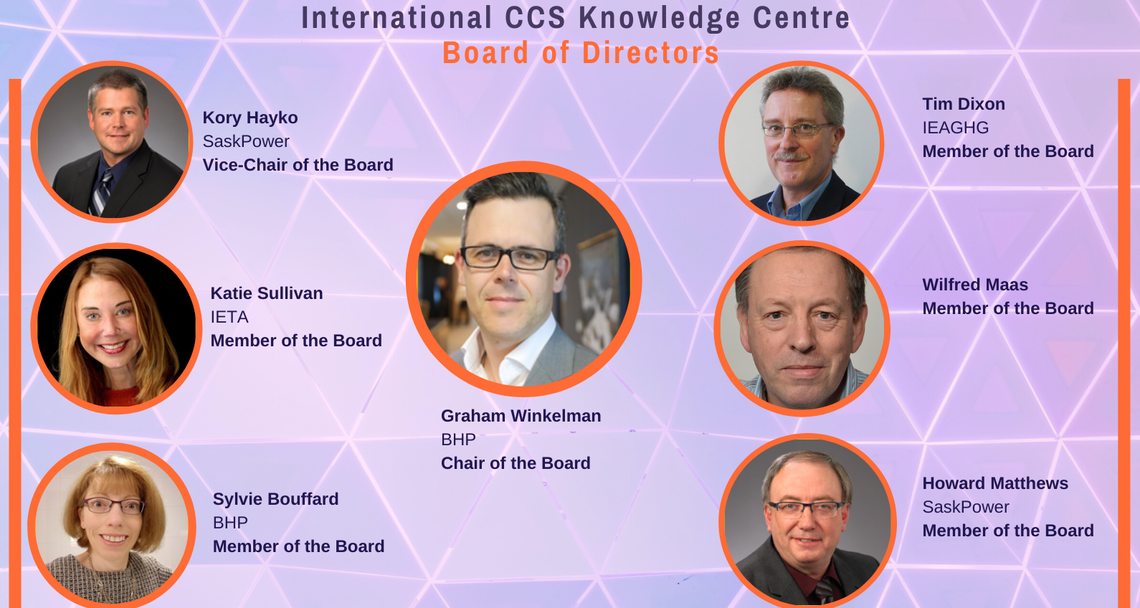To serve on a board gives a person a valuable seat behind the wheel of an organization. It’s a chance to play a key role in strategizing, with the honour, challenge and responsibility of understanding how everything works together to help an organization accomplish its goals. Phew. Not for the faint of heart. So, who are the brave hearts who serve on the board of the International CCS Knowledge Centre (Knowledge Centre), whose’s goals are to advance the understanding and use of large-scale carbon capture and storage (CCS/CCUS) as a means of managing greenhouse (GHG) emissions, globally?
The Knowledge Centre recently caught up with a few of the members to capture their thoughts and inquire as to what they appreciate about being able to serve and the value the Knowledge Centre brings to climate action.
For Tim Dixon Director and General Manager for the IEA Greenhouse Gas R&D Programme (IEAGHG), being a member of the board of the Knowledge Centre is important because of its unique ability to share the learnings from the world’s first full-scale capture on a coal power unit, thereby countering those who say that CCS technology does not exist yet at scale.
Tim has been at IEAGHG since 2008 and is responsible for managing the R&D programme, ensuring that IEAGHG activities provide the technical evidence-base to support CCS development and deployment. It’s an easy leap to make to understand how Tim’s involvement as a board member is such a natural fit. He says, “sharing the learnings to other potential CCS projects, both in power and in cement, is vital if we are to accelerate CCS deployment and to bring down costs.”
To Tim’s point about countering skeptics, Wilfried Maas adds that he is specifically proud of the contribution the Knowledge Centre has made on the credibility of achievable cost reductions of CCS and the communication of it. An independent consultant, Wilfried was formerly General Manager of Carbon Capture and Storage Technology at Shell, supporting the technical development of Shell’s global portfolio of CCS demonstration projects. “There has been a lot of skepticism regarding the ability of the CCS industry to deliver at lower costs, says Wilfried “But the Knowledge Centre continues to message otherwise.” Wilfried is passionate to progress energy transition and deliver net-zero climate action goals as soon as possible, which he acknowledges will also mean staying aligned with substantial progress on many of the other UN Sustainable Development goals than just those related to energy.
Board member Katie Sullivan, Managing Director of IETA (the global multi-sector business voice for the intersection of markets and climate change) adds, “CCUS will not only play a vital role to help achieve net zero climate ambition but deploying these technologies will allow many economies to make this mighty transition in a manner that’s reliable, affordable and equitable.”
For countries to achieve ambitious emissions reduction goals, there needs to be accelerated progress in the commercial-scale deployment of CCS across a wide variety of applications. Governments around the world are employing a range of policy tools and incentives including tax credits and direct government grants to address roadblocks and challenges in order to promote CCS projects.
“At IETA, I see first-hand, across sectors and borders, there’s surging demand for deep technical expertise, ’real world’ experience, and targeted guidance to drive-down CCUS costs/risks and drive-up CCUS deployment, investment, and public acceptance,” says Katie.
Serving on the board right now means helping to guide the organization at a uniquely critical time. “The Knowledge Centre is a unique contributor in the CCS development to substantiate credibility with studies grounded on the experience of the Boundary Dam 3 CCS Facility,” describes Wilfried, “It is therefore well positioned to help meet demand for technical expertise, targeted guidance and “real world” experience.”
With respect to multi-sectors and market intersection, Sylvie Bouffard Principal Studies at BHP Canada Inc. and Programme Officer with the International Council on Mining and Metals (ICMM), knows all too well the application of CCS in sector cross over. Sharing knowledge, and the model of collaboration that enables this sharing, unifies the work of the Knowledge Centre with Sylvie’s role at the International Council on Mining and Metals. “Both organizations are solving industry-wide issues by convening influential parties to accelerate the pace of innovation and adoption.”
Sylvie brings significant experience in the mining industry, from across four continents and four commodities, and through a diversity of roles in research and development, engineering, project marketing and risk assurance. “The Knowledge Centre is more than an option into the basket of solutions for climate change mitigation; it is a requirement,” says Sylvie, “The reuse and recycle of greenhouse gases will become necessary, and in this matter, the Knowledge Centre will continue to have a critical and broad impact.”
Katie echoes Sylvie’s sentiment by adding, “The Knowledge Centre is an institutional catalyst to help meet the growing demand for technical expertise, experience and targeted guidance. It’s playing an indispensable role in helping governments, companies and communities navigate and advance toward net zero futures.” To that end, Sylvie says she is humbled and thankful to the Knowledge Centre staff who work with passion and commitment. “Their enthusiasm and conviction stems from a realization that each one of us is part of the solution to climate change mitigation.”
Other Knowledge Centre board members include:
Howard Matthews, Vice-President, Power Production and President and CEO of SaskPower International and Vice-Chair Kory Hayko, SaskPower Vice-President, Transmission & Industrial Services. The board is led by Dr. Graham Winkelman, head of Carbon Management at BHP based in Melbourne, Australia where his global role covers BHP’s response to climate change and energy policy, leadership of carbon capture and storage initiatives and accountability for the strategic design of the company’s public climate change targets. Graham is a key representative for BHP on the Energy Transitions Commission, which ‘aims to identify pathways for change in our energy systems to ensure both better growth and a better climate.’
